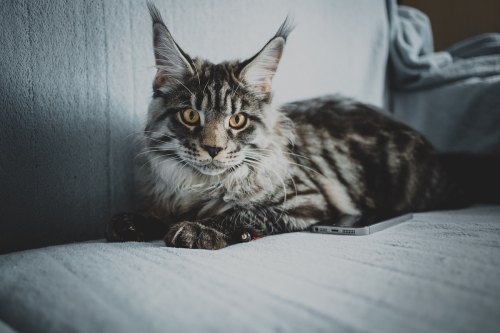
When you share your life with cats, you’ll hear them make all sorts of different noises. Meowing, purring, and even hissing or growling are all sounds that your cat uses to communicate. But there’s another noise that your cat may use and reserve for special occasions and special people. Have you heard your cat trilling? And have you wondered just what this distinct sound means?
The trill is a less common vocalization, but if your cat trills at you, you’re a lucky person. Why do cats trill? This is how to recognize cat trilling — and why it’s such a good sign.
What is cat trilling?
Cats make many sounds to communicate with humans and other cats, and you’ve probably heard many of these noises already. While meows, hisses, purrs, and growls are common and easily recognizable, trilling is a sound that cats tend to make less often. You may or may not have heard it, and it can easily be mistaken for another sound.
Trilling is a little bit meow and a little bit purr. You might describe it as a “brrr.” If your cat could roll their R’s, that’s what a trill would sound like. It’s a high-pitched sound, and your cat will keep their mouth closed when they make it.
Your cat might trill all the time, or you might never hear them make this sound. Both situations are perfectly normal. Some cats are highly vocal and use the trill constantly to communicate. Others are much more reserved and never seem to discover or care to use this vocalization.
When do cats start trilling?
We aren’t completely sure when it started, but some experts believe that cat trilling starts off as a way for mother cats to make her kittens pay attention and follow her where she needs them to go. Not long after, kittens may begin to mimic the same high-pitched sound to gain their mother’s attention. Kittens have the ability to produce sounds from birth, but experts say deliberate purring and trilling begins at around 3 weeks of age, and they become much more vocal as they learn to walk and play.
Why do cats trill?
While humans aren’t yet 100% certain of just why cats trill, they appear to do it for several different reasons.
- A greeting: Your cat may trill in greeting when you or they have just walked into the room.
- To get attention: Similarly, your cat may trill at you to get your attention. If you find your cat trilling when you’re making dinner, watching TV, or working on your laptop, then it’s probably to make you take notice. Chances are, your cat may pair trilling with head butting you or walking circles around you and wrapping their tail around your legs. These can be clear “follow me” or “pay attention to me” signals.
- They want to mate: It’s also possible that cats trill for reproductive reasons. Female cats may trill to catch the attention of a mate. Females may also trill to their kittens to get their attention and encourage them to stay close or follow them.
Why trilling is a good thing
If your cat is trilling at you, then chances are they’re happy to have you around. Trilling can be a sign of affection, and your cat is giving you a special greeting. Trilling isn’t all that common, so if you’re lucky enough to hear your cat make this sound, take it as a compliment. And if your cat trills at you regularly? That’s even better and probably means your cat enjoys your company and is showing you how much they like you.
Trilling is far from the only vocalization you’ll hear your cat make. If your cat is happy, affectionate, or trying to get your attention, you may hear them chirp or meow. Some cats may meow persistently, incorporating the occasional trill as they try to engage you. Purring is often a sign that your cat is content. Your cat might be dozing on your lap and purring, but if you shift or wake them, that purr might turn into a trill to say “hi.”
Cats communicate in many ways. In addition to these vocalizations, you can watch your cat’s body language to get a sense of how they’re feeling. Your cat’s body language can help confirm the messages behind some of their vocalizations, allowing you to better understand what they’re trying to tell you. Consider taking a few minutes each day to research and review common cat body postures and movements. You’ll learn to better read your cat’s facial and overall body expressions. The process will take some time, but if you carefully watch your cat, you’ll be able to understand them and communicate with them more clearly and effectively.
Editors' Recommendations
- Why do cats’ eyes dilate? What your pet’s extra big peepers mean
- Cats chirping at birds is totally normal (and here’s why you should encourage it)
- Why do cats twitch in their sleep? The real reasons behind this curious behavior
- Why do cats cover their face when they sleep? This adorable behavior, explained
- Is your cat obese? 5 ways to help them slim down